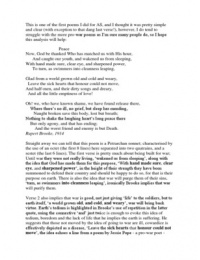This is one of the first poems I did for AS, and I thought it was pretty simple
and clear (with exception to that dang last verse!), however, I do tend to
struggle with the more pro-war poems as I’m sure many people do, so I hope
this analysis will help:
Peace
Now, God be thanked Who has matched us with His hour,
And caught our youth, and wakened us from sleeping,
With hand made sure, clear eye, and sharpened power,
To turn, as swimmers into cleanness leaping,
Glad from a world grown old and cold and weary,
Leave the sick hearts that honour could not move,
And half-men, and their dirty songs and dreary,
And all the little emptiness of love!
Oh! we, who have known shame, we have found release there,
Where there’s no ill, no grief, but sleep has mending,
Naught broken save this body, lost but breath;
Nothing to shake the laughing heart’s long peace there
But only agony, and that has ending;
And the worst friend and enemy is but Death.
Rupert Brooke, 1914
Straight away we can tell that this poem is a Petrarchan sonnet; characterised by
the use of an octet (the first 8 lines) here separated into two quatrains, and a
sestet (the last 6 lines). The first verse is pretty much about being built for war;
Until war they were not really living, ‘wakened us from sleeping’, along with
the idea that God has made them for this purpose, ‘With hand made sure, clear
eye, and sharpened power’, in the height of their strength they have been
summoned to defend their country and should be happy to do so, for that is their
purpose on earth. There is also the idea that war will purge them of their sins,
‘turn, as swimmers into cleanness leaping’, ironically Brooke implies that war
will purify them.
Verse 2 also implies that war is good, not just giving ‘life’ to the soldiers, but to
earth itself, ‘a world grown old, and cold, and weary’, war will bring back
virtue. Earth’s tedium is highlighted in Brooke’s use of repetition in the latter
quote, using the connective ‘and’ just twice is enough to evoke this idea of
tedium, boredom and the lack of life that he implies the earth is suffering. He
suggests that those not moved by the idea of going to war are ill, cowardice is
effectively depicted as a disease, ‘Leave the sick hearts that honour could not
move’, the idea echoes a line from a poem by Jessie Pope - a pro-war poet -




